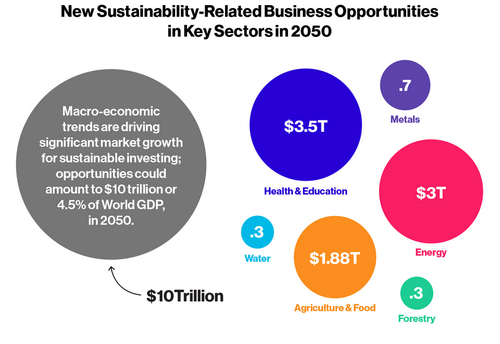Why Not Profit Responsibly?

October 12, 2015
The tides appear to be changing. Just this year Larry Fink, President and CEO of Blackrock, the world’s largest asset manager, sent a public letter to 250 leading companies urging them to resist the pressures of short-term investors and to pursue more sustainable business strategies. His admonition is part of a growing and important public debate about the negative pressures placed on companies by short-termism. A key element of this is the harm short-term investors are doing to corporate leaders who seek to implement ethically responsible business models.
Profits and responsibility have not always been associated. In fact, responsible or ethical investing has traditionally been viewed as distinct from mainstream investing because it focuses on social as well as financial returns. This approach depends on more patient capital and is therefore inconsistent with short-termism. Ethical investors include considerations of environmental, social and governance (ESG) performance in their investment decision-making. They make the case that in the long-term, companies that pay greater attention to environmental and social issues and that are rooted in strong governance models will be both financially strong and advance the public good. While the portion of funds devoted to this longer-term, sustainable-investing model is still small, it is growing.
In the past two years alone, U.S.-domiciled sustainable, responsible and impact investing has grown substantially, with total assets totaling $6.57 trillion at the start of 2014, a total gain of 76 percent over 2012. This asset classification represents 18 percent of the $36.8 trillion in assets under management in America. By the end of 2013, $1-in-every-$6 of assets under professional management in the United States was being invested using some kind of sustainable investing strategy. And investors in Europe are most active in this space, accounting for roughly 65 percent of global sustainable investing assets under management.
Though some advocates have argued that sustainable investments actually outperform the markets, the data on this point is inconclusive. What does seem true is that sustainable investment strategies yield at least comparable returns over the long term. This is not surprising given that studies show that passively managed index funds tend to perform as well as actively managed funds or even better, especially when management fees are counted against returns. Responsible investment strategies are simply another form of actively managing funds, making predictive choices based on financial and non-financial data.

A 2015 report by Morgan Stanley analyzed the performance of more than 10,000 mutual funds and found that sustainable equity funds met or exceeded median returns of traditional equity funds during 64 percent of the time periods examined. A recent Harvard Business School study analyzed the share price performance of 180 companies over 18 years and found that companies that were at the forefront of implementing sustainability programs achieved nearly 50 percent higher performance than the comparison group.
Responsibly invested funds may perform better in times of crisis by anticipating risk. Studies have shown that responsibly invested funds have lower risk, and thus perform better during periods of market crisis. In practical terms, the case for taking non-financial factors, such as risk, into account becomes obvious when looking at examples.
The case of BP’s 2010 oil spill in the Gulf of Mexico is illustrative. The spill was the worst in U.S. history, and BP has set aside $43 billion to cover fines, legal settlements and cleanup costs. However, BPs troubles were not surprising to those who were closely monitoring the company’s ESG performance. The spill was preceded by a series of environmental and safety problems, including breaches of safety laws, spills, violations of the U.S. Clean Water Act and penalties imposed by the Occupational Safety and Health Administration.
It is not possible to know whether investors could have avoided losses sustained as a result of the Gulf of Mexico oil spill by screening based on environmental and safety practices in place at BP, or by requiring more from the company in this regard. What is clear is that hundreds of thousands of investors sustained losses due to BP’s insufficient oversight of environmental and safety issues in its operations.
Investing responsibly and maximizing profits are not mutually exclusive. By thinking long-term, and factoring in ESG issues, investors are simply incorporating as much relevant data as they can into their decision-making. This data will help them assess predictability and anticipate changes, contributing to smart investing. It doesn’t seem as though there’s much to lose by taking this approach and there is much to be gained.
 Values-Based Investing
Values-Based Investing


